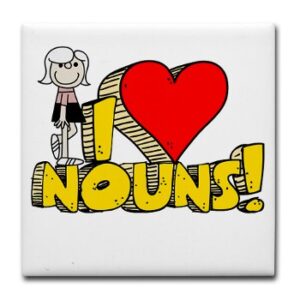Nouns – Part B
Nouns are the most basic and common types of words in the English language. They are used to describe any person, place, idea, or thing.
Nouns fall into separate categories, such as common, count, mass, collective, abstract, and others. In this post, I will be covering the more basic nouns which are used in English.

What is a noun?
Common nouns are nouns which describe a non-specific persons, places, things, and ideas. Because they do not distinguish anyone or anything in particular, they are not capitalized. An example of this would be:
- The mouse ran up the clock
- Mary had a little lamb
- I would love some brandy
There are nouns that do address a specific person, place, or thing, and for that reason they are capitalized. These are proper nouns. For example:
- I rode a Volkswagen to work today
- Prime Minister Bob is quite a guy
- There’s trouble again in the Middle East
Proper nouns are used to differentiate the common nouns that name ideas and are non-specific, from the unique and specific. Without capitalization, we have no real way of knowing whether the term middle east refers to the Middle East of the planet, or the middle east wing of some Victorian mansion, for instance.
Count nouns are used on anything that can be counted and measured. Examples:
- There are six beers on the table
- Three children were jumping on the bed
- Several years ago I went bald
Mass nouns (also known as non-count nouns) are the exception to count nouns. They refer to that which cannot be counted or measured in pure form. Words like energy, blood, water, smoke.
You may say you saw two pillars of smoke, but not two smokes. In this case, the number refers to the amount of pillars, not of smoke.
Count and non-count nouns differ according to the context in which the word is written. Some words can be used in both ways, with singular and plural making the difference. Examples:
- Danger is everywhere around us – non-count noun
- We have been through many dangers over the years – count noun
Examples of Abstract Nouns
Abstract nouns are ones which deal with that which is not a physical thing. It is a non-tangible noun. It includes words like justice, truth, and cold.
- The judge dispensed some justice
- There is a modicum of truth to what you are saying
- I was getting very cold
Sometimes, these abstract nouns can be very confusing. This is because there are times when they are used alongside determiners, which can change the sentence’s structure. Example:
In this life, we are coming in from the cold. Here the determiner the is used to refer to a specific cold. The word the is added to differentiate this cold from another.
Collective nouns are another annoying little group. They are used for collections acting as a singular. For instance, the word herd is one. Herd is referred to as a singular whole, I spite of a herd being made up of many individual animals. Example:
“Robert’s herd was the best one around, and he took great pride in it.” Here, we use the singular was and it, as opposed to the plural were and them.
Understanding What A Noun Is
Nouns may refer to a subject, object, or show possession. Through use of the noun, we can establish if the noun is the subject, object, or possessive. Examples:
- The balding teacher picked his nose – subject
- I watched the balding teacher pick his nose – object
- The balding teacher’s nose was picked clean – possessive
The apostrophe is used, alongside an additional s, to indicate possession. Sometimes the letters added are es, depending on the spelling of the noun. Sometimes the apostrophe is added after the s, depending on whether the noun is singular or plural.

I <3 nouns! Do you?
This is a relatively short rundown of the various nouns, in their basic form. There are always exceptions to the rule, and irregular nouns exist throughout the English language.
Nouns are sometimes difficult to categorize, but once you become more proficient in using them and identifying them correctly, it will become second nature. Nouns are a very important element, since they comprise the world around us. They are the names of everyone and everything that we see, touch, feel, smell, and speak of.
Have fun and keep learning!
No comments yet.